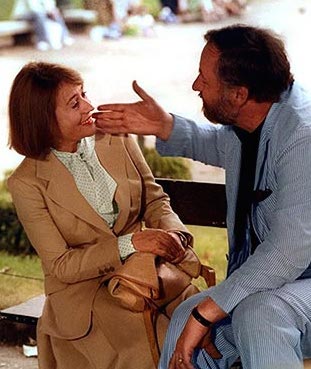Friday, March 23, 1979.
DEAR INSPECTOR (original French title: Tendre Poulet). Co-written by Michel Audiard, based on the 1976 novel Le Frelon by Jean-Paul Rouland and Claude Olivier. Music by Georges Delerue. Co-written and directed by Philippe de Broca. Running time: 105 minutes.
ANTOINE LEMERCIER (PHILIPPE NOIRET) is pretty slow on the uptake. Although he's curious and concerned about what Lise Tanquerelle (Annie Girardot) does for a living, he's no good at picking up clues.
Yesterday, he ran into her for the first time since college. They had a dinner date last night, but a beeper went off in her purse and she had to run off.
This morning, when he stopped by her suburban Paris home, she said something about the civil service. Then a shiny black car arrived to take her to work.
Well, what's a poor, middle-aged Greek professor to do? It's three bus transfers back to the Sorbonne, and that grim-looking associate of hers says they have to drive right by it.
He gets to sit in back, between two big, untalkative men, at least one of whom has something cold and hard under his suit jacket. Although the conversation is all about a recent murder, no one seems to appreciate his jokes about the police force.
Director Philippe De Broca is not only swift, he's sure. His latest film to reach these shores is Tendre Poulet (now on view at the Varsity Theatre as Dear Inspector), a picture that is a sparkling blend of romantic comedy and mystery thriller.
Although Antoine doesn't know it yet, he is trying to rekindle a youthful passion with Inspector Tanquerelle of the Paris Sûreté. She is completely delighted at the prospect, but first she must track down a murderer, a crazed killer who specializes in philandering politicians.
De Broca, a man with a marvellous eye for movement, is a master of the motion picture. His best works, including the 1966 cult classic King of Hearts, That Man From Rio (1964) and Devil by the Tail (1969), all seem to be choreographed rather than just staged.
Here, too, motion is an important element in his story-telling style. The director offers us a likeable professional pursuer chasing two men, one for herself, one for the law.
From the moment that the game is afoot, De Broca demonstrates that he can bring together all the elements with a smoothness and fluidity that is an absolute pleasure to watch.
Nor have feminists any need to worry. De Broca, as co-writer as well as director, laughs not at his characters, but at the situations they find themselves in. Inspector Tanquerelle is a thoroughly capable cop, a woman who is successfully managing a family and a career.
So much for consciousness-raising.
What you really need to know is that Dear Inspector is De Broca at his best.
And that's very, very good.
The above is a restored version of a Province review by Michael Walsh originally published in 1979. For additional information on this archived material, please visit my FAQ.
Afterword: The Parisian-born Philippe de Broca specialized in cinematic confections, rich pastries to be shared with a loved one. A participant in the French film industry’s Nouvelle Vague (New Wave), he was the one who served up dessert. “I see life in its comic aspect,” he once said, an approach that could contain considerable social commentary. That was the magic of his 1966 anti-war classic King of Hearts, the movie that introduced international audiences to the enchanting presence of Geneviève Bujold. Set during the First World War, it tells the story of a British soldier whose view of the conflict is changed by an encounter with the inmates of an abandoned insane asylum.
By the late 1970s, tastes were changing in the popular culture, and de Broca’s productions were less attractive to American film distributors. Although his Dear Inspector did well enough to justify a sequel — 1980’s On a volé la cuisse de Jupiter, in which Lise and Antoine honeymoon in Greece — that picture never made it to Vancouver. (It also inspired an American TV remake. In 1979, Brenda Vaccaro and Arlen Dean Snyder starred in Dear Detective, the two-hour pilot for a CBS-TV series that ran for just three hour-long episodes.) In 1984, de Broca turned his hand to a multinational TV project, the HBO mini-series Louisiana. A Gone with the Wind-like epic, it starred Canadian Margot Kidder as a Southern belle suffering through the U.S. Civil War. In an off-screen love story, director de Broca married his leading lady. Sadly, theirs was a brief liaison, one that ended in divorce 14 months later. Phillipe de Broca died in 2004 at the age of 71.
